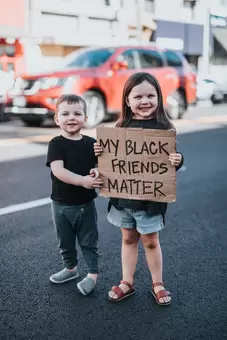|
Photo by Nathan Dumlao on Unsplash
We are living in sad, dangerous, but also hopeful times. Hope, I was reminded the other day by Marc Lamont Hill, a BET news anchor, is different than optimism. Optimism may be more idealistic in nature whereas hope intrinsically contains struggle in the context of progress, while on the path to positive change toward social justice. The death of George Floyd in recent days reminds us of the systemic and institutional racist beliefs and practices that are imbedded in American culture, whether we like it or not. That is the truth. But let’s not forget that we have come some way from segregation and Jim Crow to today, albeit slowly and painfully. Mr. Floyd in not the first African-American human being to die at the hands of police in modern society. Police brutality and racist policies in law enforcement are not new nor are they the only institutionalized policies that create and maintain white privilege. There is indeed generational trauma in black and brown families in this country as Massachusetts Representative Ayanna Pressley so eloquently described recently (she begins talking about 1 minute into the video clip), and until white parents and white adults fully see their privilege as a contributing factor and actively act to change that, we will never move toward equity under the law for all people. To get at equity under the law, we must also face inequity in health care, in housing, in education, in hiring practices, in all facets of society. This is why talking to children about racism right now through the lens of what is currently happening in the country is crucial. I’ve heard many scholars and others talk about the present time as a tipping or turning point in American culture and I agree. The largely peaceful protests that are occurring in major cities across the world are multi-generational and racially diverse, in contrast to the protests of the 1960s. All eyes, especially the eyes of young people, who do not fear seeing the truth can see what is plainly in front of them. Parents must seize the moment and begin or continue their conversation about racism in developmentally appropriate ways.
Several outlets have compiled wonderful resources for adults talking to children but also for white individuals’ own journeys toward understanding racism. I am listing some of my favorite compilations below and in addition want to highlight and add the works of: 1. Ibram X. Kendi and Jason Reynolds, especially Stamped from the Beginning: The Definitive History of Racist Ideas in America. For a 5-minute listen or read, check out this NPR story and 2. Waking Up White and Finding Myself in the Story of Race by Debby Irving, a poignant, insightful, and helpful book for exploring white privilege. The Children’s Trust Fund has compiled a wonderful list of varied resources below and I’d like to highlight those under the National Museum of African American History & Culture tab, though all are excellent:
The Isabella Gardner Museum has also compiled some reading resources here. Finally, Barnes & Noble has an extensive list of both children’s and adult books for talking about race, racism, and allyship. You can find them here. In order to be able to talk truthfully and openly to children about injustice, we must first start inward. I hope the above resources will help you and your family on your journey. I teach people how to uncover the wisdom they already carry to get new perspective on their parenting, health, and work with children and families. If you would like to feel less stressed, more confident, and happier in the way you parent, teach, lead, or live your life, GETnewperspective with me now. To your health! Dr. G. Comments are closed.
|
AuthorAnastasia Galanopoulos, Ph.D. Parent, Educator, Health Activist. A note about my signature. When I first started teaching at Wheelock College, one of my first students with whom I still keep contact, started referring to me as Dr. G. In the affectionate spirit of its tone, I adopt that nickname here. Archives
March 2021
Categories
All
|


 RSS Feed
RSS Feed